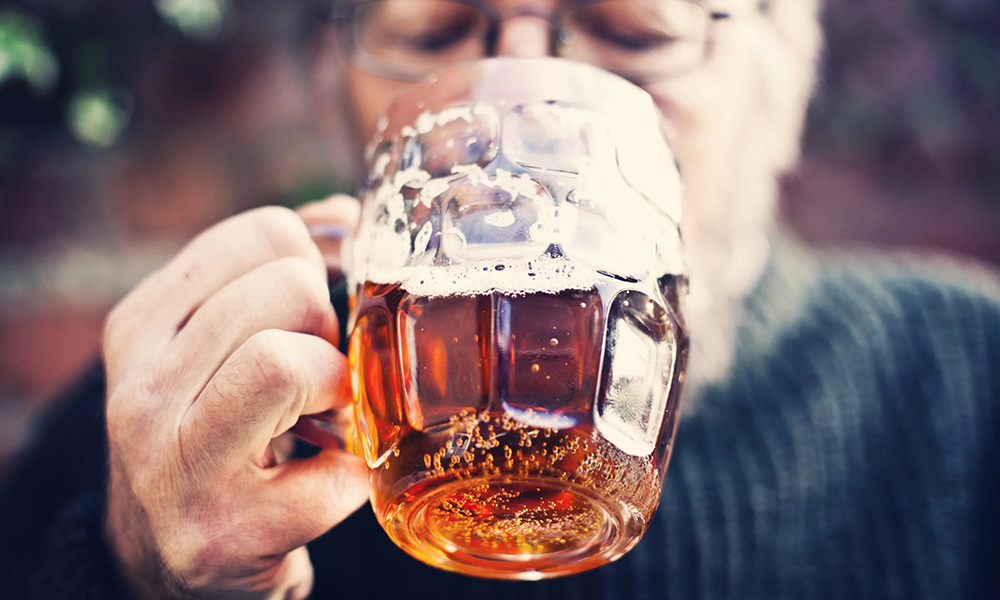
酗酒現(xiàn)象在各年齡段人群中普遍存在,但在某個特定年齡段的人群中,,這一不良習(xí)慣的增長趨勢尤為顯著,。
長期以來,酗酒常與大學(xué)生群體聯(lián)系在一起,,然而,,酗酒現(xiàn)象在老年人中呈上升趨勢。酗酒的定義是,,女性每月飲酒至少五次,,而且在兩小時內(nèi)飲用4杯或以上的酒品,男性則為每月飲酒至少五次,,而且在兩小時內(nèi)飲用5杯或以上的酒品,。根據(jù)全美藥物使用和健康調(diào)查報告,在60歲至64歲的成年人中,,有20%的人在最近一個月內(nèi)報告有酗酒行為,。65歲以上人群的酗酒率為12%,這一比例在過去十年中一直在上升,,而18至25歲年輕人的酗酒率一直在下降,。
這一令人擔(dān)憂的趨勢背后是什么?這可能會改變?nèi)藗儗凭目捶ā?/p>
美國國家酒精濫用及酗酒研究所所長喬治·F·庫布(George F. Koob)博士說:“老年人酗酒的頻率往往高于65歲以下的人群,?!彼a充說,數(shù)據(jù)顯示,,65歲及以上的人群每月至少飲酒20天的比例高于18歲至64歲的人群,。
如今,越來越多的年輕人傾向于戒酒,。蓋洛普(Gallup)的一項調(diào)查發(fā)現(xiàn),,在18歲至34歲的人群中,65%的人認為飲酒有害健康,,而在55歲及以上的人群中,,這一比例僅為39%。
雖然目前老年人酗酒的比例有所增加,,但預(yù)計在未來40年中,,這一年齡段的老年人數(shù)量將會翻倍。
庫布說:“因此,,即使老年人酗酒的比例保持不變,,老年人酗酒的絕對數(shù)量也會繼續(xù)快速增長,,這可能會給我們的醫(yī)療保健系統(tǒng)帶來越來越大的負擔(dān)?!?/p>
酗酒對老年人有什么危害,?
對于老年人來說,酒精的影響會加劇,。隨著年齡的增長,,人體保持水分的能力逐漸減弱,因此老年人會更快地感受到酒精的影響,。庫布說,,老年人代謝酒精的機制也不同。
庫布說:“隨著年齡的增長,,我們的身體會發(fā)生變化,,這些變化使得我們對飲酒帶來的潛在危害更加敏感。與年輕飲酒者相比,,老年飲酒者在執(zhí)行某些任務(wù)時的表現(xiàn)往往不盡如人意,,包括駕駛能力、反應(yīng)時間,、記憶力和平衡力,。”
此外,,即使不喝酒,,老年人也更容易出現(xiàn)平衡問題,并且容易摔倒(對于65歲及以上的人群來說,,摔倒是導(dǎo)致受傷的主要原因),。
庫布說:“研究表明,醉酒時摔倒造成的傷害往往比不飲酒時摔倒造成的傷害更為嚴重,?!泵绹膊】刂婆c預(yù)防中心(CDC)估計,近40%的跌倒與酒精有關(guān),,且血液中酒精濃度至少為0.10%,。
老年人也更有可能同時服用多種藥物,包括睡眠藥物和其他藥物,,這些藥物與酒精同時服用可能會造成危險,。
長期酗酒會增加罹患酒精使用障礙、某些癌癥,、心臟病和精神疾病的風(fēng)險,。
以下是一些有助于評估您飲酒習(xí)慣的問題
識別各個年齡段人群酗酒的跡象都頗具挑戰(zhàn),尤其是對于老年人而言。
他說:“老年飲酒者可能已經(jīng)退休,,獨居,社交活動較少,。因此,,他們的飲酒行為對工作出勤率或?qū)W習(xí)成績等傳統(tǒng)指標(biāo)的影響可能較小。"
密西根酒精依賴簡易篩查量表-老年版(SMAST-G)是一項幫助評估老年人飲酒習(xí)慣的調(diào)查,。以下是其中的一些問題:
?與他人交談時,,你是否曾低估自己的酒量?
?喝了幾杯酒后,,你是否有時會因為不覺得餓而不吃或少吃一頓飯,?
?喝幾杯酒是否有助于減輕你的顫抖或震顫?
?飲酒是否有時會讓你難以回憶起白天或晚上發(fā)生的一些事情,?
?醫(yī)生或護士是否曾對你的飲酒習(xí)慣表示擔(dān)心或憂慮,?
?你是否曾制定規(guī)則來控制飲酒?
?當(dāng)你感到孤獨時,,飲酒是否對你有所幫助,?(財富中文網(wǎng))
譯者:中慧言-王芳
酗酒現(xiàn)象在各年齡段人群中普遍存在,但在某個特定年齡段的人群中,,這一不良習(xí)慣的增長趨勢尤為顯著,。
長期以來,酗酒常與大學(xué)生群體聯(lián)系在一起,,然而,,酗酒現(xiàn)象在老年人中呈上升趨勢。酗酒的定義是,,女性每月飲酒至少五次,,而且在兩小時內(nèi)飲用4杯或以上的酒品,男性則為每月飲酒至少五次,,而且在兩小時內(nèi)飲用5杯或以上的酒品,。根據(jù)全美藥物使用和健康調(diào)查報告,在60歲至64歲的成年人中,,有20%的人在最近一個月內(nèi)報告有酗酒行為,。65歲以上人群的酗酒率為12%,這一比例在過去十年中一直在上升,,而18至25歲年輕人的酗酒率一直在下降,。
這一令人擔(dān)憂的趨勢背后是什么?這可能會改變?nèi)藗儗凭目捶ā?/p>
美國國家酒精濫用及酗酒研究所所長喬治·F·庫布(George F. Koob)博士說:“老年人酗酒的頻率往往高于65歲以下的人群,?!彼a充說,數(shù)據(jù)顯示,65歲及以上的人群每月至少飲酒20天的比例高于18歲至64歲的人群,。
如今,,越來越多的年輕人傾向于戒酒。蓋洛普(Gallup)的一項調(diào)查發(fā)現(xiàn),,在18歲至34歲的人群中,,65%的人認為飲酒有害健康,而在55歲及以上的人群中,,這一比例僅為39%,。
雖然目前老年人酗酒的比例有所增加,但預(yù)計在未來40年中,,這一年齡段的老年人數(shù)量將會翻倍,。
庫布說:“因此,即使老年人酗酒的比例保持不變,,老年人酗酒的絕對數(shù)量也會繼續(xù)快速增長,,這可能會給我們的醫(yī)療保健系統(tǒng)帶來越來越大的負擔(dān)?!?/p>
酗酒對老年人有什么危害,?
對于老年人來說,酒精的影響會加劇,。隨著年齡的增長,,人體保持水分的能力逐漸減弱,因此老年人會更快地感受到酒精的影響,。庫布說,,老年人代謝酒精的機制也不同。
庫布說:“隨著年齡的增長,,我們的身體會發(fā)生變化,,這些變化使得我們對飲酒帶來的潛在危害更加敏感。與年輕飲酒者相比,,老年飲酒者在執(zhí)行某些任務(wù)時的表現(xiàn)往往不盡如人意,,包括駕駛能力、反應(yīng)時間,、記憶力和平衡力,。”
此外,,即使不喝酒,,老年人也更容易出現(xiàn)平衡問題,并且容易摔倒(對于65歲及以上的人群來說,,摔倒是導(dǎo)致受傷的主要原因),。
庫布說:“研究表明,醉酒時摔倒造成的傷害往往比不飲酒時摔倒造成的傷害更為嚴重?!泵绹膊】刂婆c預(yù)防中心(CDC)估計,,近40%的跌倒與酒精有關(guān),且血液中酒精濃度至少為0.10%,。
老年人也更有可能同時服用多種藥物,,包括睡眠藥物和其他藥物,這些藥物與酒精同時服用可能會造成危險,。
長期酗酒會增加罹患酒精使用障礙、某些癌癥,、心臟病和精神疾病的風(fēng)險,。
以下是一些有助于評估您飲酒習(xí)慣的問題
識別各個年齡段人群酗酒的跡象都頗具挑戰(zhàn),尤其是對于老年人而言,。
他說:“老年飲酒者可能已經(jīng)退休,,獨居,社交活動較少,。因此,,他們的飲酒行為對工作出勤率或?qū)W習(xí)成績等傳統(tǒng)指標(biāo)的影響可能較小。"
密西根酒精依賴簡易篩查量表-老年版(SMAST-G)是一項幫助評估老年人飲酒習(xí)慣的調(diào)查,。以下是其中的一些問題:
?與他人交談時,,你是否曾低估自己的酒量?
?喝了幾杯酒后,,你是否有時會因為不覺得餓而不吃或少吃一頓飯,?
?喝幾杯酒是否有助于減輕你的顫抖或震顫?
?飲酒是否有時會讓你難以回憶起白天或晚上發(fā)生的一些事情,?
?醫(yī)生或護士是否曾對你的飲酒習(xí)慣表示擔(dān)心或憂慮,?
?你是否曾制定規(guī)則來控制飲酒?
?當(dāng)你感到孤獨時,,飲酒是否對你有所幫助,?(財富中文網(wǎng))
譯者:中慧言-王芳
Binge drinking is prevalent across generations, but the dangerous habit is growing among one age group in particular.
Long associated with college students, binge drinking, defined as having four or more drinks within two hours at least five times per month for women (five drinks for men) is on the rise among older adults. According to The National Survey on Drug Use and Health, 20% of adults aged 60 to 64, reported binge drinking in the last month. For those older than 65, the prevalence of binge drinking is 12%—a rate that has been increasing over the last decade, while binge drinking rates among young adults 18 to 25 have been going down.
What’s behind the concerning trend? It may be changing views on alcohol.
“Older adults who drink do so more frequently than people under 65,” says George F. Koob, PhD, director of the National Institute on Alcohol Abuse and Alcoholism, adding that the data shows a larger percentage of those 65 and older drink 20 or more days a month compared to those 18 to 64.
Today’s young adults are increasingly embracing sobriety. One Gallup survey found that 65% of 18 to 34-year-olds say alcohol is bad for your health compared to 39% of those 55 and older.
While the percentage of older adults who are binge drinkers has increased slightly, the growing number of older adults who are in this age group will double in the next 40 years.
“As a result, even if the percentage of older adults who binge remained the same, the sheer number of older adult binge drinkers would continue to grow rapidly, potentially placing an increasing burden on our healthcare system,” Koob says.
What are the dangers of binge drinking for older adults?
For older adults, alcohol’s effects are intensified. The body’s ability to retain water decreases with age, so older adults feel the effects of alcohol faster. Older adults also metabolize alcohol differently, Koob says.
“The body changes as we age and these changes render us more susceptible to some of the harms that stem from alcohol use,” Koob says. “Older drinkers show bigger impairments than younger drinkers on some tasks, including driving performance, reaction time, memory, and balance.”
Moreover, older adults are more likely to struggle with balance and experience falls even without alcohol (Falling is the leading cause of injury for those 65 and older).
“Studies suggest the injuries sustained from falls while intoxicated tend to be more severe than injuries from falls that do not involve alcohol,” Koob says. The U.S. Centers for Disease Control and Prevention (CDC) estimates that nearly 40% of falls involve alcohol and at least a blood alcohol concentration of 0.10%.
Older adults are also more likely to be on several medications, including sleep medications and other drugs, which may be dangerous when taken in combination with alcohol.
Long term binge drinking can increase the risk of alcohol use disorder, certain cancers, heart disease, and mental health disorders.
Questions to help assess your alcohol habits
Symptoms of binge drinking can be hard to decipher, especially for older adults.
“Older drinkers might be retired, live alone, and socialize less. As a result, their drinking might have less of an impact on things like work attendance or school performance,” he says.
The Short Michigan Alcoholism Screening Test–Geriatric Version (SMAST-G) is one survey to help assess older adults’ drinking habits. Here are some of the questions:
? When talking with others, do you ever underestimate how much you drink?
? After a few drinks, have you sometimes not eaten or been able to skip a meal because you didn’t feel hungry?
? Does having a few drinks help decrease your shakiness or tremors?
? Does alcohol sometimes make it hard for you to remember parts of the day or night?
? Has a doctor or nurse ever said they were worried or concerned about your drinking?
? Have you ever made rules to manage your drinking?
? When you feel lonely, does having a drink help?






